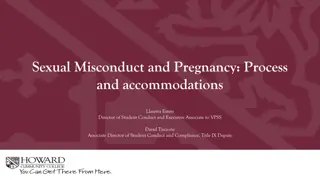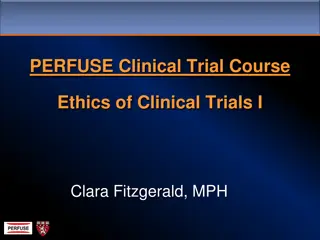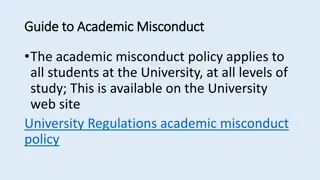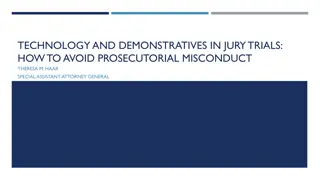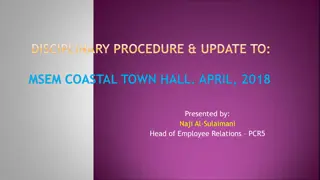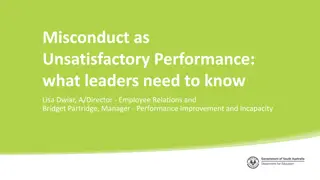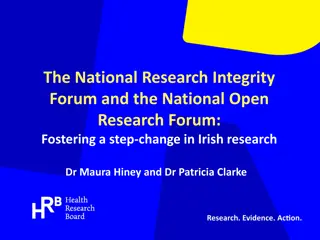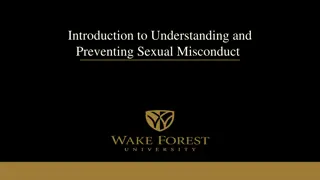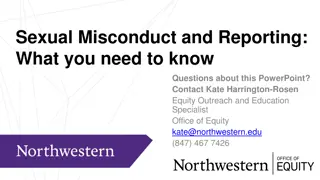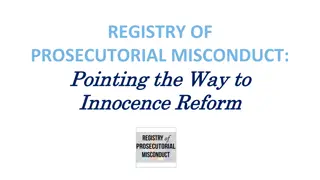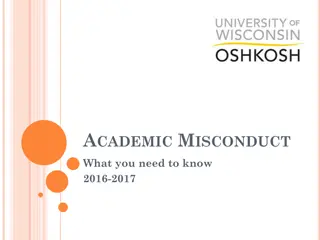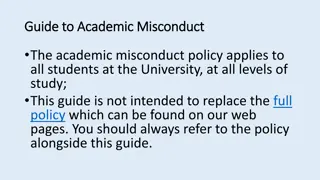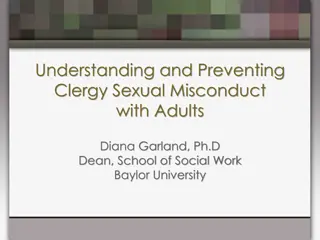Ethical Principles and Research Misconduct in Clinical Research
This session discusses the essential ethical principles governing clinical research, including respect, justice, beneficence, autonomy, and non-maleficence. It explores key documents like the Belmont Report, Nuremburg Code, and Declaration of Helsinki, emphasizing the importance of ethical conduct in research to guide decision-making and resolve dilemmas. The material also highlights the purpose of following ethical principles and the values of honesty, objectivity, integrity, and responsibility that researchers must uphold in their work.
Download Presentation

Please find below an Image/Link to download the presentation.
The content on the website is provided AS IS for your information and personal use only. It may not be sold, licensed, or shared on other websites without obtaining consent from the author. Download presentation by click this link. If you encounter any issues during the download, it is possible that the publisher has removed the file from their server.
E N D
Presentation Transcript
Session 2: Ethics and Research Misconduct Derita: Margaret: mlynn@uthsc.edu dbran@uthsc.edu https://tnctsi.uthsc.edu/training-and-education/seminars- and-workshops/tn-ctsi-certification-exam-preparation- course/
Handouts Ethic Definitions Ethical Principles Belmont Report Declaration of Helsinki Nuremburg Code Misconduct definitions Ethical Scenarios Multiple Choice Question worksheet
Foundations for Ethical Conduct in Clinical Research Nuremburg Code Declaration of Helsinki Belmont Report Code of Federal Regulations ICH GCP
Ethics are about ______________ and ______________.
Ethics are about values and norms
A system of moral principles and standards that govern a person's behavior or how an activity is conducted ETHICS Rules of conduct Dealing with what is good and bad, and with moral duty and obligation The basic concepts and fundamental principles of decent human conduct Standards of right and wrong that recommend what humans should do, usually in terms of : rights, obligations, benefits to society, fairness, or specific virtues
Purpose of Following Ethical Principles PROVIDES GUIDELINES FOR THE RESPONSIBLE CONDUCT OF RESEARCH GUIDES DECISION MAKING ASSISTS IN DILEMMA RESOLUTION
Ethical principles researchers must adhere when conducting research: Respect Justice Beneficence Autonomy Non-maleficence Accountability Ethical principles aligned with doing a good job include: Honesty Objectivity Integrity Carefulness Openness Credibility Responsibility Confidentiality
Non-maleficence Do no harm to subjects When subjects participate in a study , the expectation is they will leave the study in a state that is no worse than when they entered Negative consequences are not always entirely avoidable As researchers we have a duty to minimize the impact of such consequences Design scientific rigorous studies, with a favorable risk/benefit ratio
Accountability Obligation of the research team to do no harm, follow the protocol, regulations and guidance The study team, subjects, etc. are held accountable for their actions Follow standards for assessing and promoting ethical conduct in research
Honesty Fabrication, falsification and misrepresentation is not tolerated Report data and findings of studies accurately Researchers and the medical community must be able to trust each other's work, to provide scientific expertise that may impact health outcomes
Objectivity Ideas/findings should be based on facts and free from bias such as personal or external views Researchers should recognize any biases they may have Study team should separate facts from feelings An effective methods to maintain objectivity in data collection is to design blind research projects. Blinded studies help to eliminate bias, whether single or double- blinded
Integrity Utilizing verifiable methods in proposing, performing, and evaluating research Reporting findings when adhering to rules, regulations, guidelines Creates trust Ensures research is conducted according to the highest standards of practice Validates the research was conducted with minimal risk or harmful outcomes to subjects
Carefulness Develop processes to prevent careless errors such as a QA system Maintain accurate and complete Essential documents Follow ALCOA-C when documenting
Ask the Right Questions When Making Ethical decisions Which choice could stand up to further publicity and scrutiny? Which choice could you not live with or live with? What would the wisest person you know do if he/she were in your situation/ethical dilemma? Which choice would be the most ethical, just, fair, or responsible?
What Can You Do to Make Research Ethical? Assess benefits/risk ratio, ensure ratio is acceptable Beware of potential vulnerabilities of subjects Avoid /manage conflicts of interest Follow regulations/guidance
After considering all of our discussions, you might find it difficult to decide what to do If this is the case, then you may want to consider others ways of making the decision, Things to Consider In the end, when making a decision regarding an ethical dilemma, you have to be able to justify Go with your intuition Explore different options Gather more information Seek guidance Ask more questions your decision
Who are Your Resources? Are there any people who can offer ethical advice for research? It may be useful to seek advice from one of the following persons: Trusted colleague Senior researcher Department chair Compliance officer Staff member/Director of an Institutional Review Board
Treat ethical dilemmas as learning opportunities and grow as researchers There are differences in people s responses to ethical issues Protect research subjects from harm Ethical issues will continue
Federal Definition of Misconduct Actions must : represent a significant departure from accepted practices have been committed intentionally, or knowingly, or recklessly be proven by a preponderance of evidence According to the statement, research misconduct does not include differences of opinion
Falsification, Fabrication, and Plagiarism Falsification is manipulating research materials, equipment, or processes, or changing or omitting data or results such that the research is not accurately represented in the research record. (NIH definition) Fabrication is making up data or results. (NIH definition) Plagiarism is the appropriation of another person s ideas, processes, results, or words without giving appropriate credit. ( NIH definition)
Historical Events of Misconduct Tuskegee Study Nazi Willowbrook Study Experiments Guatemala Syphilis Study Henrietta lacks Eric Poehlman Andrew Wakefield Jesse Gelsinger John Darsee
Tuskegee Syphilis Study 1932-1972 Doctors from the U.S. Public Health Service (PHS) conducted the study Began in 1932, no known treatment for syphilis Subjects were promised free medical care, 600 men originally were enrolled in the project, 399 men with latent syphilis and a control group of 201 They were informed they were being treated for bad blood , a term commonly used in the area referring to a variety of ailments Monitoring was provided by health workers. The men were only given placebos such as aspirin and mineral supplements even after the fact penicillin became a recommended treatment for syphilis in 1947 Researchers provided no effective care as the men experienced severe health problems due to their untreated syphilis, such as death, blindness, and insanity
Tuskegee Syphilis Study 1932-1972 In the mid-1960s, Peter Buxton, a PHS venereal disease investigator in San Francisco expressed his concerns of the study being unethical to his superiors. In response, a committee was formed to review the study but ultimately opted to continue it. Their goal was to gather data until all of the participants died, autopsies could be performed, and data analysis was completed Buxton leaked the story to a reporter friend and that person leaked the story to Jean Heller of the Associated Press. Heller broke the story in July 1972, the public was out-raged and the study was forced to shut down By 1972, 28 participants had died from syphilis, 100 more had passed away from related complications, at least 40 spouses had been diagnosed with it and the disease had been passed to 19 children at birth
Tuskegee Syphilis Study 1932-1972 Congress held hearings in 1973 and in 1974 the study s surviving participants and the heirs of those who died received a $10 million out-of-court settlement New guidelines were issued to protect human subjects in U.S. government- funded research projects The final study participant passed away in 2004
Ethical Dilemmas With the Tuskegee Study Conducted without informed consent Subjects were not provided appropriate treatment Lack of adequate information regarding the purpose of the study Vulnerable population Incentives- free medical care, free meals, burial insurance Resulted with the creation of the Belmont Report
Nazi Experiments Series of medical experiments on large numbers of prisoners, including children, by Nazi Germany in its concentration camps in the 1940s, during WWII and the Holocaust The experiments were considered medical torture Nazi doctors and their assistants forced prisoners into participating The subjects did not give consent Most experiments resulted in death, trauma, disfigurement or permanent disability These crimes were tried after the war and were named the Doctors Trials The findings of the trials led to the Nuremburg Code
Experiments on Twins Bone, Muscle, ad nerve transplant Head injury experiments Malaria experiments Immunization experiments Epidemic jaundice Sulfonamide experiments Freezing and Sea Water experiments Poison experiments Incendiary bomb experiments Mustard gas experiments High altitude experiments
Ethical Dilemmas with the Nazi Experiments Subjects- prisoners, children in concentration camps Experiments were considered medical torture Consent was not obtained Most experiments resulted in death, trauma, disfigurement, or permanent disability The crimes were tried after the war and named the Doctors Trials Resulted in the creation of the Nuremburg Code Establishment of IRBs
Willowbrook Study Began in 1956 and was conducted for 14 years Subjects- more than 700 mentally disabled children housed at the Willowbrook State School in Staten Island , New York were Intentionally infected with hepatitis Purpose: attempt to track the natural progression of the disease Determine the effectiveness of gamma globulin injections as a prevention of contracting hepatitis Justification: The school had a high infection rate of hepatitis and it was inevitable that all the children would eventually become infected
Ethical Dilemmas of the Willowbrook Study Caused harm to healthy subjects Some subjects became carriers of hepatitis and were later were reintegrated into public schools Informed Consent- The researchers obtained consent from the parents of each child. Possibility of coercion Respect for Persons- Under crowded conditions, parents were told the only space available was in the hepatitis research building Many parents agreed to the enrollment of their child in the research area , because they could not afford to take care of their child outside of a facility like Willowbrook
Guatemala Syphilis Study American medical research project conducted by US government lasting from 1946 to 1948 Infected hundreds of prisoners, psychiatric patients and sex workers during the 1940s with STDs to study the effects of penicillin Many of the subjects were low-ranking soldiers delivered by their superiors to US physicians working from a military base in the capital All were enrolled in the experiments without their consent ranging in age from 10- 72 Remained a secret, for more than six decades. On October 1, 2010, U.S. Pres. Obama contacted the president of Guatemala, lvaro Colom, to apologize for the unethical nature of the research.
Ethical Dilemmas With the Guatemala Study No consent The experiments were conducted in non-sterile clinical settings Harm to subjects Subjects- vulnerable individuals
Henrietta Lacks Her cervical cancer cells became the first immortal human cell line HeLa cells are shipped all over the world Her cells are used for all kinds of medical research
Ethical Dilemmas for Henrietta Lacks No consent She nor her family were aware of the cell line Others received monetary benefits from her cell line while she and her family struggled financially She and her family struggled to receive healthcare they needed
Eric Poehlman Tenured research professor at the University of Vermont (UVM) College of Medicine Guilty of falsifying and fabricating research data in numerous federal grant applications and in academic articles from 1992 to 2002 Agreed to plead guilty to making false statements in a research grant application in April 1999, upon which the National Institutes of Health (NIH) paid $542,000 for Dr. Poehlman's research activities Barred for life from seeking or receiving funding from any federal agency in the future Agreed to submit numerous letters of retraction and correction to scientific journals related to his scientific misconduct Permanently excluded from participation in all Federal health care programs
Andrew Wakefield He and 12 of his colleagues published a case series in the Lancet which suggested that the measles, mumps, and rubella (MMR) vaccine may predispose children to behavioral regression and developmental disorders in children Case Series- Small sample size, an uncontrolled study design, and speculative conclusions The paper received wide publicity MMR vaccination rates began to drop as parents were concerned regarding the risk of autism after receiving the MMR vaccination Almost immediately afterward, epidemiological studies were conducted and published, contradicting the possible link between MMR vaccination and autism
Jesse Gelsinger Two patients suffered SAEs, the FDA was not notified and the study was not placed on hold as required The Investigators had notified the FDA they would tighten up the eligibility criteria, but they never followed through Pretrial test results showed Jesse had poor liver function, which was an exclusion to participation Failures in the informed-consent process, Jesse was not provided information about the earlier patients SAEs
Jesse Gelsinger The PI also had a conflict of interest, as he had a stake in the company that owned the gene-transfer technology and stood to benefit if the trial succeeded The Gelsinger family sued, and the university quickly settled for an undisclosed sum Penn State declined to take responsibility for Jesse s death The FDA suspended human research at Penn s Institute for Human Gene Therapy in January of 2000, and the university eventually shut the program down
John Darsee Fabricated the bulk of his 100 publications, over 14 years at two respected medical research centers, Harvard and Emory Dismissed and a 10-year cutoff from Federal research funds Approximately 82 papers have been retracted
Reasons for Misconduct AMBITIONS CAREER ADVANCEMENT FINANCIAL BENEFITS BAD PERSON
How to Prevent Misconduct Develop and maintain processes and high standards for accuracy in the data reported Take responsibility for your research and report accurate and re-producible data Research records should be: detailed in order to authenticate the records, reproduce the research results, confirm the validity of the results resolve any questions that may be asked from honest error or misinterpretation PI and other appropriate authority oversight
Occurrence of Misconduct Overall estimated cases of research misconduct in the US is one case out of every 100,000 investigators Almost 300 received allegations of misconduct by the US Office of Research Integrity annually as last reported There are approximately 2 million active investigators in the US Data was not collected on research misconduct until the 1990s
Results of Misconduct Negative consequences for all of science leading to untrusting of research Research and medical setbacks Lost time, retracted publications Damaged reputations Excluded from conducting research Deaths, harm to subjects Jail time, monetary fines
Which of the following are true regarding the Tuskegee study? a. The principles of the Belmont Report were violated b. Exploitation of a vulnerable population c. The study provided a community service d. a. and b. e. All of the above
The following 3 questions are regarding the Tuskegee study and the principles of the Belmont Report. The principle of respect was violated Increase harm and no benefit The principle of beneficence was violated No informed consent The principle of justice Focused solely AA men with syphilis
The Willowbrook study violated the principles of the Belmont Report. Principles of Beneficence No benefit Principle of Justice Possibility of Coercion Principle for Respect No need to study this population








 undefined
undefined


